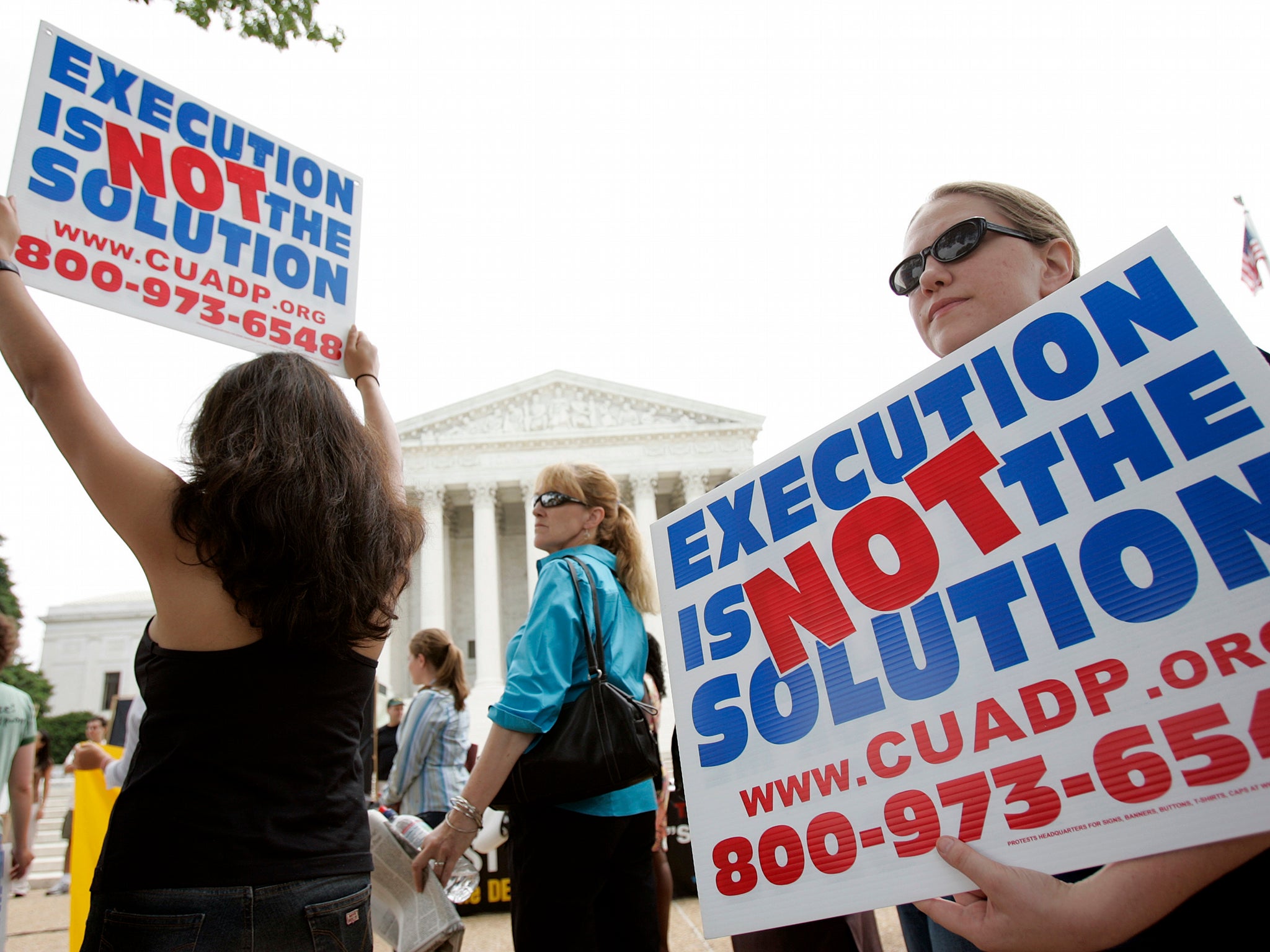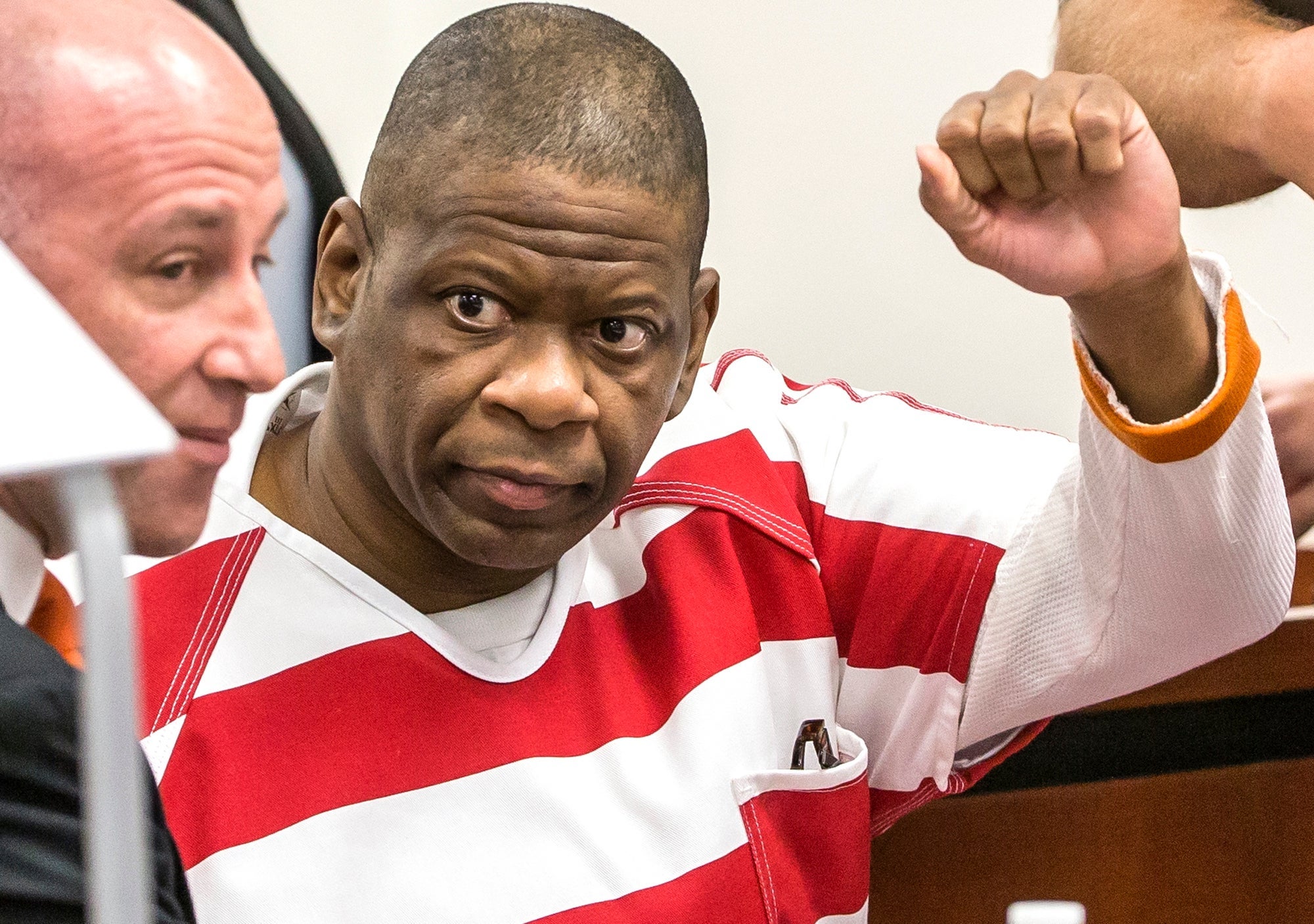Trump losing support for death penalty despite vows to revive it
Flurry of high-profile exonerations helps downward trend
Your support helps us to tell the story
From reproductive rights to climate change to Big Tech, The Independent is on the ground when the story is developing. Whether it's investigating the financials of Elon Musk's pro-Trump PAC or producing our latest documentary, 'The A Word', which shines a light on the American women fighting for reproductive rights, we know how important it is to parse out the facts from the messaging.
At such a critical moment in US history, we need reporters on the ground. Your donation allows us to keep sending journalists to speak to both sides of the story.
The Independent is trusted by Americans across the entire political spectrum. And unlike many other quality news outlets, we choose not to lock Americans out of our reporting and analysis with paywalls. We believe quality journalism should be available to everyone, paid for by those who can afford it.
Your support makes all the difference.In May, New Hampshire became the 21st state to abolish the death penalty, when politicians overrode a veto by Republican Chris Sununu. After that, Robert Dunham started to see the map in a whole new way.
Mr Dunham, who leads the nonprofit Death Penalty Information Centre, saw that the death penalty had disappeared not only from New England but largely from the Mid-Atlantic to Appalachia.
“I MapQuested this,” Mr Dunham told The Washington Post ahead of the centre’s release of its new report on Tuesday. “If you started your car in Madawaska, Maine, and you drove it to Fort Gay, West Virginia, you would go 1,289 miles without setting a tyre in a death penalty state.”
The disappearance of the death penalty in the Northeast marks its steady decline across the US, which continued in 2019, according to the report. Despite Donald Trump’s desire to resume federal executions, use of and support for the death penalty trended downward by almost every metric: Nationwide, there were fewer than 30 executions and 50 death sentences for the fifth year in a row. Public support for the death penalty remains near a 47-year low.
Throughout the year, the death penalty was a recurring news story because of a flurry of high-profile exonerations, temporary reprieves and commutations. Meanwhile, the Supreme Court did relatively little with the death penalty but had an “inordinate amount of controversy”, according to Mr Dunham.
Twenty-two people were executed this year in a handful of states: Alabama, Florida, Georgia, Missouri, South Dakota, Tennessee and Texas. The 33 death sentences (issued as of mid-December) came from 28 counties, or fewer than 1 per cent of all counties in the country, effectively making those that produced the majority of the nation’s death sentences outliers in their own states, according to the report.
“That’s a 75 per cent drop in executions from their peak at the end of the 1990s and an 85 per cent drop in death sentences since their peak in the mid-’90s,” Mr Dunham said.
As downward trends held steady, there were also exceptional developments in how states administered capital punishment and how the wider public reacted. In addition to New Hampshire’s abolition, California governor Gavin Newsom issued a moratorium on executions in May. The state holds a quarter of all death row prisoners in the United States.
“California has by far the largest death row in the country, so the moratorium means a huge effective decline in America’s death row,” Brandon Garrett, a Duke law professor who has written several books on the death penalty and prosecution, said in an email. “Over time, more states that are not executing anyone may reconsider the considerable expense of the death penalty as not a worthwhile use of resources.”
Earlier this year, Oregon vastly curtailed instances when the death penalty could be imposed. As of mid-December, Indiana marked a full decade with no executions.
“Any one of these, or even a combination of a few, would be a lot for a year,” Mr Garrett said. “But all of them together is remarkable.”

The Trump administration‘s effort to revive federal executions places it increasingly out of touch with the majority of Americans: A record 60 per cent of Americans favour life without parole over execution, according to the latest Gallup poll.
In two of the most high-profile Supreme Court cases of the year, criticism of state misconduct was dragged into full view. The cases of Rodney Reed in Texas and Curtis Flowers in Mississippi were extraordinary and sensational, Mr Dunham said.
“Both Flowers and Reed embodied the legacy of lynching,” he said.
Flowers has been tried six times in the same killings, a case that was thrust into the national spotlight by the popular American Public Media podcast In the Dark. His latest conviction in a 1996 quadruple killing in a Mississippi furniture store came under review by the Supreme Court, which overturned the guilty finding in the summer as it ruled that a white prosecutor worked to keep African Americans off the jury.

Reed’s case, meanwhile, attracted the attention of a wide range of high-profile figures, including senator Ted Cruz, Kim Kardashian West and Oprah Winfrey. Reed received a rare last-minute stay of execution as supporters called for DNA evidence that could exonerate him to be tested. Reed, who is black, is accused of raping and murdering Stacey Stites, a white woman who was engaged to a police officer. Reed maintained the two were having a consensual affair and that Stites’ fiance murdered her out of anger over her affair.
Two brothers who collectively spent nearly 50 years on death row for unrelated crimes made headlines when they were exonerated in July.
“Americans now know that innocent people are at risk of being executed. For years, death penalty proponents denied that. But with 166 exonerations, only the most ardent innocence denier claims there is no risk of executing the innocent,” Mr Dunham said. “I think cases like this just add to the perception that the government cannot be trusted to be fair in these cases.”
“African Americans have known this all along,” he added. “The question is whether events like this will make a dent in the psyche of white Americans.”
Dale Baich, an assistant federal public defender in Arizona, said exonerations can go a long way in turning people against the death penalty.
“What the exonerations do is it makes the public and the legislature more aware that there are problems with the death penalty. Even if a person committed the crime, is this the kind of case where we want to impose the death sentence?” Mr Baich said.
Even as death penalty supporters increasingly become outliers, there is still some support for the death penalty beyond the White House and conservative Supreme Court justices.
“There are some prosecutors in some jurisdictions that are still aggressively seeking death,” Mr Baich said, pointing to district attorneys in Maricopa County, Arizona, and Riverside County, California, which together have generated more than third of all death sentences since 2014.
“We had a client in Utah, Ron Lafferty, who had cancer and was confined to a bed, and the state was moving forward to carry out his execution. But rather than say, ‘Look, he’s going to die of cancer, let’s just end this [effort]’, the state was aggressively appealing the case in the courts,” Mr Baich said. Lafferty, who spent 34 years on death row for the murder of his sister-in-law and her daughter, died of natural causes in November.
The argument Mr Baich hears most often from those who defend pursuing executions for years-old or problematic death sentences is that “it’s the sentence that was imposed by the jury or the court, and [their] job is to carry out the judgment of the court”, he said.
From his view as a federal public defender, Mr Baich said, 2019 was steady, continuing trends of the previous five years. But he agreed that if the death penalty wasn’t a mainstream issue already, it became one this year.
“I think it’s there. It’s no longer a third rail in politics,” he said. “You have bipartisan efforts in a number of states around the country. I think it’s trending in that direction so that, in the end, we’ll have few outliers.”
The Washington Post

Join our commenting forum
Join thought-provoking conversations, follow other Independent readers and see their replies
Comments